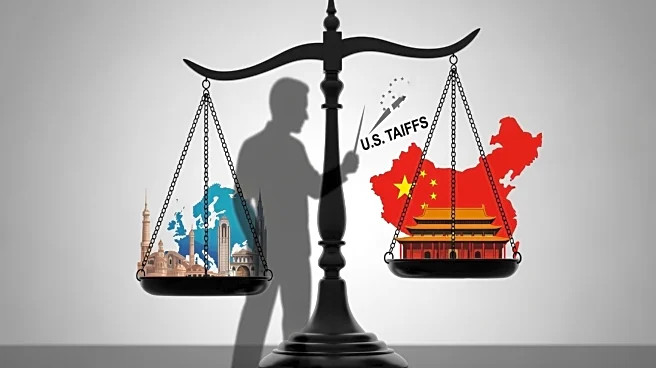What's Happening?
The ongoing trade tensions between the United States and China have led to significant global economic shifts, with Europe now reconsidering its trade strategy with China. Bundesbank President Joachim Nagel has emphasized the need for Europe to adopt
a more assertive approach in its trade dealings with China to protect its own interests. The U.S. has imposed tariffs on Chinese goods, prompting China to reroute its exports to other markets, including Europe. This has resulted in European companies facing increased competition from Chinese products offered at lower prices. Additionally, European firms are struggling to compete with domestic Chinese brands, further complicating the trade landscape.
Why It's Important?
The trade dynamics between the U.S., China, and Europe are crucial as they impact global economic stability. The U.S. tariffs have not only affected China but have also had a ripple effect on Europe, which is now facing challenges in its trade relations with China. Europe's response to these challenges is significant as it could influence global trade policies and economic alliances. A more assertive European stance could lead to a realignment of trade partnerships and potentially mitigate the adverse effects of the U.S.-China trade tensions on European markets. This situation underscores the interconnectedness of global economies and the need for strategic trade policies.
What's Next?
Europe is likely to continue evaluating its trade policies with China, balancing the need for dialogue with the necessity of protecting its markets. The European Union may consider implementing measures to safeguard its industries from the influx of cheaper Chinese goods. Additionally, ongoing discussions within the European Central Bank and among EU member states could lead to coordinated actions to strengthen Europe's economic position. The outcome of these deliberations will be closely watched by global economic stakeholders, as they could set precedents for future trade negotiations.
Beyond the Headlines
The current trade tensions highlight the broader implications of global economic interdependence. Europe's response to the U.S.-China trade conflict could influence its geopolitical standing and its role in international trade. The situation also raises questions about the sustainability of current trade practices and the need for more resilient economic strategies. As Europe navigates these challenges, it may also need to address internal economic disparities and strengthen its collective bargaining power on the global stage.















